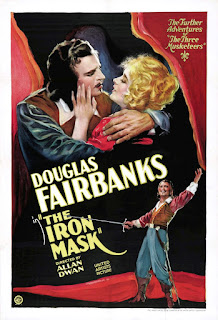The Iron Mask of 1929 is a sequel to Douglas Fairbanks' The Three Musketeers of 1921. It is also his last silent feature, although it includes a brief introduction and intermission in sound. Like its predecessor, its production values are of the highest order with lavish sets, an enormous cast of extras, and a heartfelt dedication to verisimilitude as demonstrated by a declaration in the credits that "This entire production was under the supervision of Maurice Leloir, Member of the Society of French Artists, illustrator of 'The Three Musketeers,' the acknowledged authority on the period depicted." No expense seems to have been spared to bring that period to life.
The Iron Mask covers a greater span of time as well as a greater span of joy and sorrow. Based on events in Alexandre Dumas' novels, the film begins in 1638 with the birth of the future king of France, Louis XIV, and ends 24 years later. It begins also with D'Artagnan's love for Constance and the loyalty of four friends that even death cannot sever. Fairbanks' acting skills have noticeably matured just as his D'Artagnan matures, and the tragedy from which the audience was spared in 1921 is finally played out midway through the picture probably to better effect.
The sombre moments are fittingly counterbalanced with most of the best swashbuckling elements: romance, espionage, derring-do, and high-spirited (and humorous) carousing. There is, perhaps, a little less swordplay than might be expected, primarily occurring in the middle and climax of the film, but swordplay itself is less the focus of a Douglas Fairbanks movie than the acrobatics and physical shenanigans he integrates into any action sequence.
Solid performances are given by Rolfe Sedan as Louis XIII, Belle Bennett as the Queen Mother (an improvement over Mary MacLaren's portrayal), and Dorothy Revier as Milady de Winter. Nigel De Brulier reprises his role as Cardinal Richelieu perhaps a little more convincingly, and Marguerite De La Motte reprises her role as Constance Bonacieux quite capably. The weak link in this film is William Bakewell's dual performance as Louis XIV and his twin brother. Although the former is rendered somewhat more sympathetically than the historical inspiration, the latter is reduced to the equivalent of a moustache-twirling villain of the type who ties damsels to railroad tracks (or would if trains had existed in 17th century France). This is disappointing, but it is not enough of a flaw to ruin the totality of the picture.
In the end, it is a lovingly crafted adieu to an era, and at the same time it is "The Beginning" of the next, which would soon see the rise of Errol Flynn.
Writing: GoodDirecting: Good
Acting: Good
Cinematography: Great
Stunts: Great
Swordplay: Fair
Panache: Great
Overall Rating: Good
Swashbuckling Rank: Good
[Originally posted in Cuparius.com on 8 September 2011.]
Addendum
Written by: Douglas Fairbanks and Jack Cunningham
Based on: The Vicomte de Bragelonne by Alexandre Dumas
Directed by: Allan Dwan
Performed by: Douglas Fairbanks, Belle Bennett, Marguerite De La Motte, Dorothy Revier, Vera Lewis, Rolfe Sedan, William Bakewell, et al.

No comments:
Post a Comment